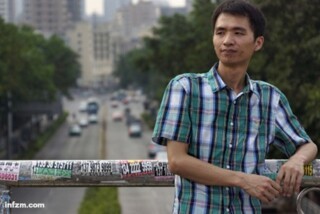Accidental Death of a Poet
Sheng Yun
Xu Lizhi threw himself from a Foxconn workers’ dormitory building in Shenzhen on 30 September. He was 24 years old, a migrant worker and a poet: neither line of work looks promising in China at the moment. In the 1980s ‘poet’ was a prestigious job-description, and did wonders for your love life. Now none of the papers would waste space on a poem, even as filler; if a self-advertised ‘poet’ turned up on a dating site there’d be no takers and plenty of eye-rolling: poets must be weird or poor, or both. Modern poetry was more or less buried, along with China’s golden 1980s, in the year we’re not suppose to mention.
Xu started working at Foxconn in 2010. He left in February this year and went to join his girlfriend in Suzhou. Six months later he was back in Shenzhen. He looked for work elsewhere in the city –what he really wanted was to be a librarian – but didn’t get any of the jobs he applied for. He returned to Foxconn on 29 September.
There have been 18 suicide attempts at Foxconn factories in the last five years. As the main manufacturer of Apple products, employing hundreds of thousands of people, the company’s image is sexy and cutting-edge. The factory compound in Shenzhen is clean and well managed; the recruitment fair always attracts a lot of young workers. The company’s chairman, Terry Gou (he’s from Taiwan),built it from nothing and liked to hire migrant workers without experience of assembly work: compliant twentysomethings with no great future and no land to cultivate at home.
If a minor character in a movie asked the hero what it took to be a good private eye and the hero answered ‘a big bladder’, it would be funny. But at Foxconn it’s no joke. Workers have ten minutes maximum for visits to the toilet, which are possible only if a supervisor is available to stand in for them on the shop floor. The toilets are equipped with cameras. When your time’s up, a loudspeaker calls for you by name. Most workers don’t drink anything before or during a shift.
To insure against a united workforce the company puts workers from the same parts of the country in different dormitories. Roommates barely have time to fraternise in any case. You could jump off the building and nobody would have a clue. After six suicides in 2010, Foxconn engaged a group of Buddhist monks to bless the company in a ‘difficult’ time (Steve Jobs meanwhile observed that at least the suicide rate at Foxconn was lower than in the United States). It later set up ‘venting rooms’ where distressed workers can hit punchbags with the faces of Foxconn execs on them.
Assembly line workers earn on average ¥2000 (£200) a month. They are encouraged to think that one day they could be like their bosses; in fact they are expendable and the work is highly repetitive.Even so a mistake can cost a whole month’s salary.
From Xu’s poems, some of which read very well in Chinese, we get a glimpse of what he and other young migrant workers have been through:
We ran along the railway,
arriving in some place called ‘the City’
where we trade in our youth, and our muscle.
Finally we have nothing to trade, only a cough
and a skeleton nobody cares about.‘Sleepless’
Midnight. Everyone is sleeping soundly,
We keep our pair of young wounds open.
These black eyes, can you really lead us to the light?‘Night Shift’
‘Night Shift’ is a direct (and sceptical) allusion to a famous verse by Gu Cheng (roughly: ‘The dark nights gave me my dark eyes; I nonetheless use them to look for light’). Gu Cheng had all the time in the world, and frittered it away. He killed his wife with an axe, then hanged himself. Xu had very little time and few choices. A lot of young workers have, like him, left Foxconn and later returned. There’s a bit of doggerel doing the rounds about their situation (Lanxiang is China’s most prestigious technical school):
An old friend at Foxconn just quit
for Lanxiang, to better his skills:
Wonderful Lanxiang, the perfect fit;
Jobs for all graduates, perks and frills.
He’s back now at Foxconn. Oh shit.
City people find this funny.

Comments
Foxconn also has enormous contracts with Sony, Amazon, Microsoft and Nintendo... but the real point is much larger.
My iPhone is one of the most empowering things I've ever held in my hand, a work of creative genius, part of a world-changing shift in communication … and there is no possible justification for it and objects like it to be made at this cost.
The fantasy, the deep life- and world-destroying lie bound up in neoliberal capitalism, is that when we maximize for efficiency of production, all other good things will follow. The reality is that we are surrounded by necessary good things that are being destroyed.